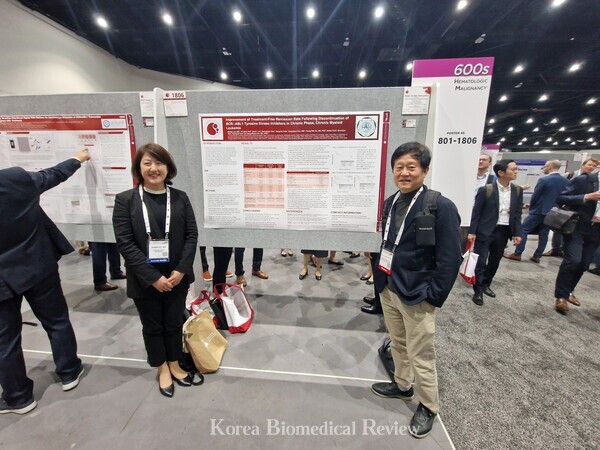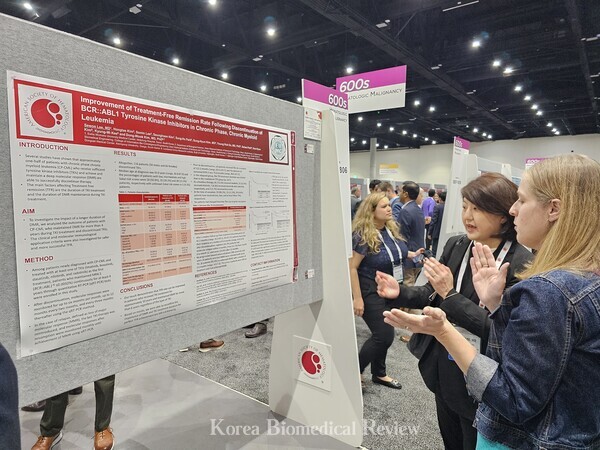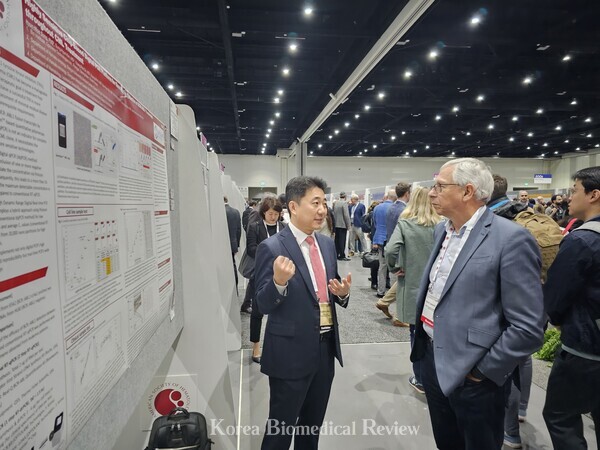SAN DIEGO, Calif. – By Lee Han-soo/Korea Biomedical Review correspondent -- Korean researchers have presented evidence that brings people a step closer to achieving the goal of treatment-free remission (TFR) in the treatment of chronic myeloid leukemia (CML). Capturing significant attention, the research findings were presented at the American Society of Hematology (ASH) 2023 conference held in San Diego, Calif., spanning from Saturday to Tuesday.
These developments are part of a growing global trend in CML treatment. Across continents, researchers and clinicians are increasingly focusing on strategies to enable patients to maintain remission without lifelong dependence on medication. This shift is driven by the desire to improve patient's quality of life by reducing the long-term side effects and financial burden of continuous drug therapy.

One of the notable studies in the field included a study presented by a Korean research team, led by Professor Lee Se-won at Ewha Womans University Mokdong Hospital, which showed findings in achieving TFR in chronic phase CML (CP-CML) patients who had undergone long-term Tyrosine Kinase Inhibitor (TKI) therapy.
The study involved 116 patients who maintained a deep molecular response (DMR) for over six years, and the team observed that patients treated with TKIs for about 10 years, regardless of the TKI type, showed improved TFR rates post-medication discontinuation.
This research, aimed at understanding the impact of prolonged TKI treatment and sustained DMR on TFR achievement, involved patients diagnosed with chronic phase CML who used at least one of the TKIs -- imatinib, bosutinib, dasatinib, nilotinib, radotinib -- as a first-line treatment and maintained MR 4.5 for at least four years. Molecular responses were meticulously monitored following a structured schedule post-drug discontinuation.
As a result, the median TKI treatment duration before discontinuation was approximately 10.18 years, and the median duration of sustained MR 4.5 was about 6.25 years. Patients who relapsed after discontinuing TKI treatment had shorter TKI treatment durations than those who maintained TFR, pointing to the feasibility of stopping drug treatment in carefully monitored patients.

"The patients included in this analysis have been part of the Korean Imatinib Discontinuation Study (KIDS) from the beginning," Professor Lee told Korea Biomedical Review. "They have been followed for a period of over ten years, and this includes patients who have maintained Major Molecular Response (MMR) for more than six years."
Lee stressed that normally, only about 50 percent of patients who are adequately treated with TKIs and achieve and maintain DMR have been able to discontinue treatment successfully.
"However, this study has shown that the longer the duration of TKI treatment and DMR maintenance, the greater the improvement in TFR," she said. "Until now, due to the success rate being only about half, patients have been very fearful of discontinuing medication."
However, this study has shown that for patients who have well-maintained their drug treatment over a long period, the success rate has risen to over 70 percent, providing a basis for them to confidently attempt discontinuing medication, Lee added.
Lee stressed that there is a need to quickly establish guidelines for discontinuing medication. "Once that happens, it will open up the possibility for patients who no longer need drug treatment to discontinue it and lead better lives for the remainder of their days," she said.
These findings are expected to contribute significantly to revised guidelines by the European Leukemia Net (ELN) for TKI discontinuation. Professor Kim Dong-wook at Ewha Womans University Mokdong Hospital, a leading CML expert, has played a pivotal role in this research and the ongoing efforts to establish these guidelines.
Professor Kim, who was also at the scene, highlighted the critical role of sensitive MRD measurement in deciding whether to discontinue drugs for CML.
A key innovation related to this matter that was presented during the conference was the High Dynamic Range Digital Real-time PCR (HDR-drPCR) technology developed by Optolane, a Korean medical device maker.

This novel diagnostic tool provides more sensitive and accurate detection of BCR-ABL1 transcripts in CML patients than traditional Taqman-based quantitative PCR (qPCR). Its superior ability to detect very low levels of these transcripts is critical for accurately monitoring the disease and facilitating TFR.
Kim, who was involved in developing high-sensitivity chip-based digital PCR technology with Optolane, said that the technology is capable of detecting BCR-ABL1 transcripts up to MR 6.34, which is much higher than the MR 4.5 that conventional devices are able to detect.
"There are only a few companies in the world that have developed and launched a chip-based digital PCR like Optolane's, and the detection performance of their products is exceptional," Kim said. "This technology promises to minimize false positives and is crucial in facilitating the application of TFR."
Related articles
- [ASH 2023] Blood disorder innovators highlight latest progress at US meet
- [ASH 2023] ‘Hanmi’s AML drug tuspetinib shows high CR rate combined with venetocrax’
- [ASH 2023] Epcoritamab and lenalidomide show promising results in challenging DLBCL cases
- [ASH 2023] New combo therapy for rare lymphoma shows encouraging outcomes
- Korean bio ventures withdraw IPO plans amid increased KRX scrutiny

